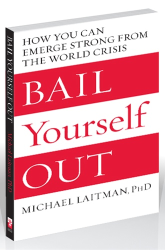“Despite massive wealth creation, happiness has not risen since the 1950s in the US or Britain… No researcher questions these facts. So accelerated economic growth is not a goal for which we should make large sacrifices. In particular, we should not sacrifice the most important source of happiness, which is the quality of human relationships—at home, at work, and in the community.”
–Richard Layard, The Financial Times, March 11, 2009
Why Human Nature, and Not the Economy, Should be Regulated
No aspect of our lives better expresses our interconnectedness than the economy. When we are united, the economy is the first to thrive and boosts every aspect of our lives along with it. But when we are separated from each other, it is the first to collapse. Then, everything grinds to a halt along with it.
Centuries ago, when we first began to trade with each other, we began to interconnect, and globalization was born. If we knew then about the desire to receive and the desire to give, the history of humanity would be very different from the bloody march of folly it has turned out to be.
Today, it is impossible to “de-globalize” the world. We must begin to act as one united humanity, in line with nature’s principle of collaboration and self-fulfillment, or life as we know it will end. And the way to unite is to become aware of the two desires and employ both in our negotiations, especially around finances, given today’s monetary crisis.
It is not tougher regulation or buying of “toxic assets” that will help us through the present crisis. The way out is to understand that what needs to be regulated is human nature, not the economy. Our economy is only a projection of our one-track minds: receiving, receiving, and more receiving.
Today, humanity must come to realize that it is in our best interest to consider others in our plans, or else those plans will fail. Therefore, the first step in the financial bailout plan should be to share information and provide facts about the kind of world we live in, which is global and interdependent.
People should know that there are two forces running the world. The first is the desire to receive, which economists call “the profit-oriented economy,” meaning capitalism. The second force is the desire to give, which aims to increase general prosperity and well-being.
The Lazy Man’s Guide to the Dark Side of the Free Market
Simply put, in today’s financial dealings, everyone must profit or no one will profit. To be exact, the term, “everyone,” does not refer to the parties involved in a contract, but to the entire world.
Does that mean that before every new deal or agreement, the parties must knock on the door of every home in the world, explain the proposed deal, and ask for a signed consent to it? This would hardly be practical. All it means is that we must change our attitude towards considering everyone’s benefit instead of ours alone.
For example, whenever a new product is launched, the manufacturer immediately seeks to outdo its competitors. The new company aims to increase its market share, and we call this process, “capitalism.” However, at the end of the day, what is really happening is an attempt to “steal” customers from those already in the market. This is the accepted norm.
Similarly, banks today are not committed to boosting the faltering economy or assisting people who want to start businesses or buy homes. Banks want only one thing: to make as much money as they can for their shareholders (owners/directors). And if they have to pay their lower-ranking employees shameful wages, or grant people criminally irresponsible loans and then sell those loans to insurance companies, which then try to toss the hot potato until someone finally gets stuck with it, it’s all part of “business as usual.” Their only aim is to write billions on the plus column at the end of every quarter.
And this attitude is not the sole property of banks. Essentially, every business operates this way, from insurance companies, through banks and hedge funds, down to the mom-and-pop grocery stores. We call it the “free market.”
Today, however, we must all undertake a serious inspection of our system to see where we have gone wrong. When we do so, we will see that there is nothing wrong with the idea of having banks or insurance companies in our world. Banks are potentially a good thing, because without them we could not finance our dreams. Insurance companies are also positive forces because they guarantee that we will not be thrown out on the street, should something go wrong in our lives.
Therefore, all that needs to change is the business’ goal—from benefitting itself, at the expense of its competitors, to benefitting the whole of society. We should plan our financial dealings in such a way that the net profits will go toward promoting humanity, instead of the business. In business, as in politics, protectionism is a double-edged sword, which punishes its operator far worse than its intended target.
Did You Know that Mutual Benefit Translates into Huge Mutual Profit?
When TV, arts, and schools change the social atmosphere to one of caring and camaraderie, accolade will be a prize worth winning. Then, instead of the current profit-oriented system, the reward for benefitting society will be social recognition and appreciation.
Thus, if all of us aim to benefit more than just ourselves or our shareholders, we and all our customers will prosper because people will trust each other. Clearly, where money is concerned, trust is paramount.
Currently, banks have no trust in other banks. Insurance companies also have no trust in banks, or in each other, and no one trusts the borrowers, because borrowers cannot trust their employers to not fire them the next day, because the employers themselves are dependent on market demand, and no one trusts the market these days.
This brings us back to the first point: studying nature’s laws. We are not going to trust each other until we understand how we, and the whole of reality, are formulated. Then, we can collectively decide to follow that inner formula of balance. When we do, borrowers will trust their employers, who will trust the banks, who will trust the insurance companies, and everyone will trust the market.
Thus, until we learn to function as one big united human family, we will not recover from the recession. But when we do, we will not only have everything we need for comfortable living, we will be secure in knowing that we will have it in the future, and so will our children and our children’s children.
 “What Makes a Healthy Economy? Why, Healthy Relationships of Course!” is based on the book, Bail Yourself Out: How You Can Emerge Strong from the World Crisis by Dr. Michael Laitman.
“What Makes a Healthy Economy? Why, Healthy Relationships of Course!” is based on the book, Bail Yourself Out: How You Can Emerge Strong from the World Crisis by Dr. Michael Laitman.

